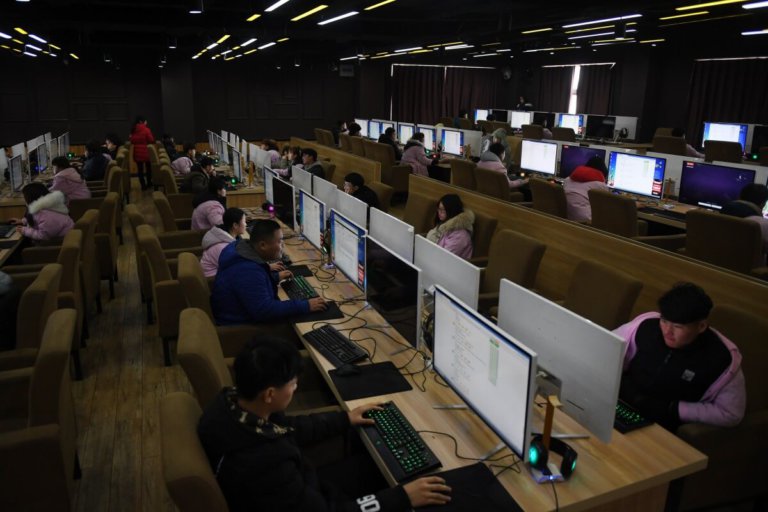
If you’re planning to study overseas, you may be wondering what the future holds for higher education amid a challenging COVID-19 climate.
To answer that is EY-Parthenon Education Managing Director Matt Robb.
In a recent webinar hosted by international higher education network Quacquarelli Symonds (QS), Robb was joined by QS CEO Nunzio Quacquarelli and QS Marketing Director Paul Raybould to walk us through the challenges universities could face amid the disruption of COVID-19.
Their main talking points include how universities can counteract these challenges so that your study journey will sail smoothly.

When student receive their university offers, they’ll be wondering what happens next. Source: Eric Feferberg/AFP
Universities must strategise with scenario modelling
“Right now we are talking to universities across the world about three things,” says Robb.
“One is the safety and security of staff, the second is to try and secure cash flow and financial security of the institutions and then the third is scenario modelling about what will happen next.”
To effectively prepare for what will happen next in the higher education landscape, the Ernst & Young (EY) education strategist believes that universities must examine and evaluate possible scenarios in the future.
“For instance, how long will COVID last and what happens if it lasts a little longer,” he adds.
By scenario modelling, universities could get have a better idea on how to safeguard your future if any unforeseen disruptions occur.
Join us tomorrow at 10:00 EDT / 15:00 BST / 16:00 CEST to explore what the future holds for the higher education sector after the coronavirus outbreak. Reserve your place here: https://t.co/OaJ2drn3FV #HE #coronovirus #webinar pic.twitter.com/pv6obTwsJz
— QS Quacquarelli Symonds (@QS_Corporate) April 22, 2020
Universities should adopt life-shaped learning
During this difficult time, Robb says it’s “certain” that most universities are communicating less with their new students.
“So universities should really make them feel welcome and make them feel like the system they have up for their first year is going to be good enough,” he said.
“And offer flexibility in start dates and modalities — what other universities have labelled as life-shaped learning.”
Matt also advises universities to implement remote learning throughout their courses, if they haven’t already, and to start migrating to digital and online content.
“It’s one thing to say, look we’ll email you a bunch of books in PDF format and we’ll organise some kind of Zoom meeting for now.
“But I think if that’s the mode you’re promising through September, October, and potentially though the new calendar year in January February — students are going to think ‘Is my degree really going to work with just digital correspondence?’”
Robb makes a valid point. What works for you, may not work for others.
Plus, you may have mixed feelings about starting the first year of your degree online, and not on campus with your peers and professors.
Therefore, universities must adopt life-based learning to ensure that you feel welcomed and that your learning preferences are taken into account.

Are you anxious about the future of higher education? Source: Greg Baker/AFP
Universities should keep an open-mind
No one knows exactly what the future of higher education will look like, but Robb has a pretty good idea.
“I think there is going to be some sector restructuring, such as a merge between further education and vocational colleges, in order to reduce costs and provide something more vocational and employment-oriented,” he says.
As for course formats, Robb notes that the battle between short-term courses and graduate degrees has long been contested.
“The more that course content is broken up into short courses and universities get comfortable with micro accreditations, it will become more possible to leave with partial credentials,” he said.
“Therefore the global labour market will get more used to using them and accepting them.”
The Ernst & Young (EY) education strategist doesn’t think that the traditional Bachelor’s degree will take a backseat anytime soon either, and that changes in higher education qualifications heavily depends on labour market acceptance.
“From what we know about what employers value, it’s very clear that short courses and stackable and micro-credentials are useful tiebreakers between two candidates going for the same position,” he said.
“But they don’t stand up to a degree.”
QS CEO Nunzio Quacquarell agrees.
“Within our surveys, as recently as last year, less than 25 percent of employers that were responding were recognising online degrees,” he explained.
“There’s still lots of room for growth. Employers’ views will change and I do think that this experience (COVID) will accelerate that change.”
Alongside universities, make sure that you, as a student, are ready to brace the changes in higher education too. Get ready to take on shifts in employers’ expectations, especially because these shifts can impact your future job candidacy and career growth.







